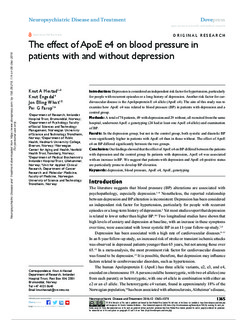| dc.contributor.author | Hestad, Knut | |
| dc.contributor.author | Engedal, Knut | |
| dc.contributor.author | Whist, Jon Elling | |
| dc.contributor.author | Farup, Per Grønaas | |
| dc.date.accessioned | 2017-02-08T09:26:11Z | |
| dc.date.available | 2017-02-08T09:26:11Z | |
| dc.date.created | 2016-06-29T11:18:50Z | |
| dc.date.issued | 2016 | |
| dc.identifier.citation | Neuropsychiatric Disease and Treatment. 2016, 12 1365-1370. | nb_NO |
| dc.identifier.issn | 1176-6328 | |
| dc.identifier.uri | http://hdl.handle.net/11250/2429893 | |
| dc.description | This is an Open Access article licensed under the Creative Commons Attribution License 3.0 (CC BY 3.0) and originally published in Neuropsychiatric Disease and Treatment. You can access the article by following this link: https://dx.doi.org/10.2147/NDT.S106933 | |
| dc.description | Dette er en vitenskapelig, fagfellevurdert artikkel som opprinnelig ble publisert i Neuropsychiatric Disease and Treatment. Artikkelen er publisert under lisensen Creative Commons Attribution License 3.0 (CC BY 3.0). Du kan også få tilgang til artikkelen ved å følge denne lenken: https://dx.doi.org/10.2147/NDT.S106933 | |
| dc.description.abstract | Introduction: Depression is considered an independent risk factor for hypertension, particularly for people with recurrent episodes or a long history of depression. Another risk factor for cardiovascular disease is the Apolipoprotein E e4 allele (ApoE e4). The aim of this study was to examine how ApoE e4 was related to blood pressure (BP) in patients with depression and a control group. Methods: A total of 78 patients, 49 with depression and 29 without, all recruited from the same hospital, underwent ApoE e genotyping (24 had at least one ApoE e4 allele) and examination of BP. Results: In the depression group, but not in the control group, both systolic and diastolic BP were significantly higher in patients with ApoE e4 than in those without. The effect of ApoE e4 on BP differed significantly between the two groups. Conclusion: Our findings showed that the effect of ApoE e4 on BP differed between the patients with depression and the control group. In patients with depression, ApoE e4 was associated with an increase in BP. We suggest that patients with depression and ApoE e4-positive status are particularly prone to develop BP elevation. | nb_NO |
| dc.language.iso | eng | nb_NO |
| dc.rights | Attribution-NonCommercial-NoDerivatives 4.0 Internasjonal | * |
| dc.rights.uri | http://creativecommons.org/licenses/by-nc-nd/4.0/deed.no | * |
| dc.title | The effect of ApoE e4 on blood pressure in patients with and without depression | nb_NO |
| dc.type | Journal article | nb_NO |
| dc.type | Peer reviewed | nb_NO |
| dc.source.pagenumber | 1365-1370 | nb_NO |
| dc.source.volume | 12 | nb_NO |
| dc.source.journal | Neuropsychiatric Disease and Treatment | nb_NO |
| dc.identifier.doi | 10.2147/NDT.S106933 | |
| dc.identifier.cristin | 1364911 | |
| cristin.unitcode | 209,40,6,0 | |
| cristin.unitname | Institutt for helsefag | |
| cristin.ispublished | true | |
| cristin.fulltext | original | |
| cristin.qualitycode | 1 | |

